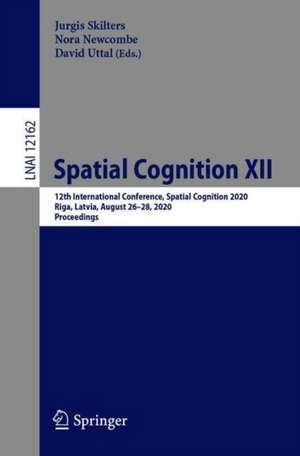Spatial Cognition XII: 12th International Conference, Spatial Cognition 2020, Riga, Latvia, August 26–28, 2020, Proceedings: Lecture Notes in Computer Science, cartea 12162
Editat de Jurǵis Šķilters, Nora S. Newcombe, David Uttalen Limba Engleză Paperback – 20 aug 2020
The 19 full papers and 6 short papers presented in this book were carefully selected and reviewed from 50 submissions. They focus on the following topics: spatial representation and cognitive maps; navigation and wayfinding; spatial representation in language, logic, and narrative; and spatial abilities and learning.
Din seria Lecture Notes in Computer Science
- 20%
 Preț: 1061.55 lei
Preț: 1061.55 lei - 20%
 Preț: 307.71 lei
Preț: 307.71 lei - 20%
 Preț: 438.69 lei
Preț: 438.69 lei - 20%
 Preț: 579.30 lei
Preț: 579.30 lei -
 Preț: 410.88 lei
Preț: 410.88 lei - 17%
 Preț: 427.22 lei
Preț: 427.22 lei - 20%
 Preț: 596.46 lei
Preț: 596.46 lei - 15%
 Preț: 448.04 lei
Preț: 448.04 lei - 20%
 Preț: 353.50 lei
Preț: 353.50 lei -
 Preț: 389.49 lei
Preț: 389.49 lei - 20%
 Preț: 309.90 lei
Preț: 309.90 lei - 20%
 Preț: 645.28 lei
Preț: 645.28 lei - 20%
 Preț: 763.23 lei
Preț: 763.23 lei - 15%
 Preț: 580.46 lei
Preț: 580.46 lei - 20%
 Preț: 310.28 lei
Preț: 310.28 lei - 20%
 Preț: 655.02 lei
Preț: 655.02 lei - 20%
 Preț: 1183.14 lei
Preț: 1183.14 lei - 20%
 Preț: 340.32 lei
Preț: 340.32 lei -
 Preț: 449.57 lei
Preț: 449.57 lei - 20%
 Preț: 591.51 lei
Preț: 591.51 lei - 18%
 Preț: 938.83 lei
Preț: 938.83 lei - 20%
 Preț: 337.00 lei
Preț: 337.00 lei - 20%
 Preț: 649.50 lei
Preț: 649.50 lei - 20%
 Preț: 607.40 lei
Preț: 607.40 lei - 20%
 Preț: 1414.79 lei
Preț: 1414.79 lei - 20%
 Preț: 1024.44 lei
Preț: 1024.44 lei - 20%
 Preț: 583.40 lei
Preț: 583.40 lei - 20%
 Preț: 453.32 lei
Preț: 453.32 lei - 20%
 Preț: 575.49 lei
Preț: 575.49 lei - 20%
 Preț: 1075.26 lei
Preț: 1075.26 lei - 20%
 Preț: 585.88 lei
Preț: 585.88 lei - 20%
 Preț: 825.93 lei
Preț: 825.93 lei - 17%
 Preț: 360.20 lei
Preț: 360.20 lei - 20%
 Preț: 763.23 lei
Preț: 763.23 lei - 20%
 Preț: 340.32 lei
Preț: 340.32 lei - 20%
 Preț: 504.58 lei
Preț: 504.58 lei - 20%
 Preț: 369.13 lei
Preț: 369.13 lei - 20%
 Preț: 580.93 lei
Preț: 580.93 lei - 20%
 Preț: 343.62 lei
Preț: 343.62 lei - 20%
 Preț: 350.21 lei
Preț: 350.21 lei - 20%
 Preț: 583.40 lei
Preț: 583.40 lei - 20%
 Preț: 583.40 lei
Preț: 583.40 lei - 15%
 Preț: 438.59 lei
Preț: 438.59 lei - 20%
 Preț: 341.95 lei
Preț: 341.95 lei - 20%
 Preț: 238.01 lei
Preț: 238.01 lei - 20%
 Preț: 538.30 lei
Preț: 538.30 lei
Preț: 505.81 lei
Preț vechi: 632.26 lei
-20% Nou
Puncte Express: 759
Preț estimativ în valută:
96.80€ • 105.11$ • 81.31£
96.80€ • 105.11$ • 81.31£
Carte tipărită la comandă
Livrare economică 22 aprilie-06 mai
Preluare comenzi: 021 569.72.76
Specificații
ISBN-13: 9783030579821
ISBN-10: 3030579824
Pagini: 350
Ilustrații: XI, 336 p. 126 illus., 94 illus. in color.
Dimensiuni: 155 x 235 mm
Greutate: 0.49 kg
Ediția:1st ed. 2020
Editura: Springer International Publishing
Colecția Springer
Seriile Lecture Notes in Computer Science, Lecture Notes in Artificial Intelligence
Locul publicării:Cham, Switzerland
ISBN-10: 3030579824
Pagini: 350
Ilustrații: XI, 336 p. 126 illus., 94 illus. in color.
Dimensiuni: 155 x 235 mm
Greutate: 0.49 kg
Ediția:1st ed. 2020
Editura: Springer International Publishing
Colecția Springer
Seriile Lecture Notes in Computer Science, Lecture Notes in Artificial Intelligence
Locul publicării:Cham, Switzerland
Cuprins
Spatial representation and cognitive maps.- Dual Population Coding for Path Planning in Graphs with Overlapping Place Representations.- Dynamic Problem Solving in Space.- How to Model (Personalised) Landmarks?.- The Influence of Position on Spatial Representation in Working Memory.- Spatial Representation in Sequential Action Organization of Weakly Constrained Everyday Activities.- Understanding Cognitive Saliency by Using an Online game.- A Framework for Place-based Survey Implementation.- A Study on Visual and Structural Characteristics of Landmarks and Experts’ and Non-experts’ Evaluations.- Navigation and wayfinding.- Redefining Global and Local Landmarks: When Does a Landmark Stop Being Local and Become a Global One?.- Local Wayfinding Decisions in a Complex Real-World Building.- Developing a Replication of a Wayfinding Study. From a Large-scale Real Building to a Virtual Reality Simulation.- Investigation of Potential Cognition Factors Correlated to Fire Evacuation.- Comparing Human Wayfinding Behavior Between a Real, Existing Building, a Virtual Replica, and Two Architectural Redesigns.- Motion Features of Digital Path Tracing in Urban Map Navigation.- Investigating Wayfinding under Inconsistent Information.- Applying Psychophysics to Applied Spatial Cognition Research.- Spatial representation in language, logic, and narrative.- Spatial Descriptions on a Functional-geometric Spectrum: the Location of Objects.- Cross-linguistic Differences in Side Assignment to Objects and Interpretation of Spatial Relations: Right and Left in German and Italian.- Local Alignment of Frame of Reference Assignment in English and Swedish Dialogue.- A Logical Framework for Spatial Mental Models.- The Spatiotemporal Dimension of Singular Reference.- Spatial abilities and learning.- Minecraft as a Generative Platform for Analyzing and Practicing Spatial Reasoning.- ERMENTAL: A Simple Web Environment to Design and Teach the Effects ofCognitive Training Experiments.- The Function of Gesture in Architectural-Design-Related Spatial Ability.- Impacts of Scent on Mental Cutting Ability for Industrial and Engineering Technology Students as Measured through a Sectional View Drawing.
